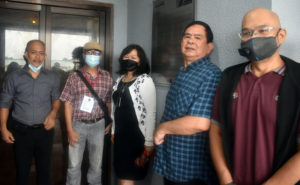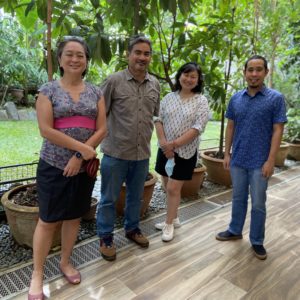Quezon City Chronicles: Duality
My father turns 91 this Sunday. My siblings and I were supposed to celebrate with Mama and Papa in a big celebration but sickness got in the way—cancer, COVID. The big Cs. Although in the back of our minds we try to prepare for the impending decline of health, we are never as ready as we imagine. We are never ready because we cannot predict what will happen.
As a dual citizen who makes regular trips to the Philippines from Chicago, I believed I could combine my knowledge of both worlds to assess the situation of my parents’ ill health. I would read up on the treatments they were undergoing in the Philippines and compare that with the latest research in the US. I would demand the credentials of their doctors and find out if they graduated from an American university. I would seek other nonmedical cures for the symptoms that afflict them. I was confident that I, with my brothers who live in Canada, would manage the quality of their care, and that my parents would feel so fortunate that they have children abroad.

Well, that confidence was short-lived. Upon landing in the Philippines in June, ready to do battle with illness that made my parents suffer, I quickly learned one thing: The color of my skin changes when I switch countries. The “other” person holds a lens that distorts who I really am.
In the U.S., I am a brown American, sometimes seen as a foreigner who doesn’t deserve to breathe the same air as more fair-complexioned nationals. In the Philippines, I am a lighter-skinned, entitled FilAm who feels that her residence in a developed country gives her a superpower and everybody else must recognize that. In the U.S., white Americans look at me askance, sometimes in wonderment, when I speak English fluently, not hesitating to converse with them. In the Philippines, I see amusement in my kababayan’s eyes when I speak in ‘colegiala” Tagalog.
Last June, I rarely ventured out of my parents’ house because of COVID, which was a relief in some ways. Although I missed snorkeling in Puerto Galera with my friend the pawikan, I enjoyed the home immersion. Each meal was prepared by someone else, brought upstairs, and shared with Mama. I didn’t have to do laundry. Weekly TV movies with my sister’s family while indulging in ice cream and potato chips was great, although it usually took several tries to upload the movie. Finding remedies for Papa’s skin sensitivity became a challenge I couldn’t ignore. I saw only a few friends, vestigial reminders of my formerly active life there. I needed to become myself again, despite the Anti-Asian rhetoric in the U.S., despite the “inggit” in the Philippines because I had been fully Pfizer-vaccinated.
Life and death, sickness and health, isolation and belonging—life is dual. My citizenship is dual. Relationships vacillate between love and loathing. Complexions change. But the swinging from one to the other, that is constant. When the body is weak, the mind can be strong. When emotions overpower will, the body says, “Sleep. Rest. I refuse to function properly without care.” We are never suspended in just one place. “We are never as happy or unhappy as we imagine (Francois de la Rochefoucauld).” If that is hope, I’ll take it.
Above left photo: An afternoon talking about biodiversity conservation.
Above right photo: Almira reconnecting with a few friends. Erehwon Art Policy Council members convene at the center for its inaugural meeting and unveiling of a memorial plaque in honor of Behn Cervantes.





Leave a Reply